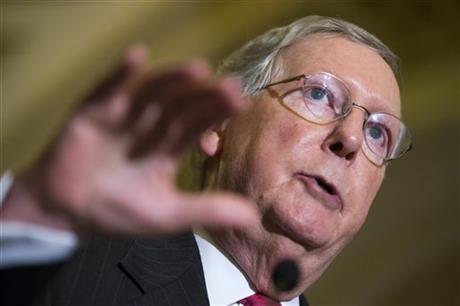
The Senate was poised to vote on legislation that would keep the government open beyond next Wednesday’s deadline, but at a price Democrats are certain to reject: stripping taxpayer money from Planned Parenthood.
The stopgap spending bill, which would keep the government operating through Dec. 11, was expected to fail in Thursday’s vote.
The next steps were unclear, although Senate Majority Leader Mitch McConnell, R-Ky., has promised there will not be a government shutdown. That suggests he soon would press ahead with a short-term measure free of the Planned Parenthood dispute.
Some of Capitol Hill’s most ardent conservatives are not afraid of extending the battle over Planned Parenthood, even if it would result in a partial shutdown. GOP leaders, on the other hand, are motivated chiefly by a desire to avoid a repeat of the 2013 closure, which hurt the party politically.
McConnell appears to enjoy support from a majority of the Republican rank and file.
“I’d rather it defund Planned Parenthood, but if the votes aren’t there, I don’t see the point of having a standoff,” said Sen. Roger Wicker, R-Miss., chairman of the Senate GOP’s campaign committee.
Sen. Ted Cruz, R-Texas, who is using his rivalry with GOP leaders in Washington to help define his presidential campaign, responded in an editorial essay in Politico that simply the threat of a shutdown was sending “Republican leadership running for the hills.”
McConnell set up Thursday’s vote but appeared likely to pivot to a more traditional temporary funding bill that would win support from Senate Democrats and President Barack Obama.
Sending such a measure to the GOP-controlled House just a day or two before a potential shutdown seems aimed at giving Republican leaders in the House the push needed to roll over recalcitrant tea partyers opposed to a bill that fails to take on Planned Parenthood.
Internal GOP divisions over what tactics to use to take on Planned Parenthood have House leaders tied in knots, and they have been unable to take on their traditional role of initiating spending legislation. There are rumblings among conservatives over a vote to remove House Speaker John Boehner, R-Ohio.
Planned Parenthood has long been targeted by Republicans, but the effort took on greater urgency after the release of secretly recorded videos that show organization officials discussing methods of procuring tissue from aborted fetuses and compensation for shipping it to researchers. The group says it is doing nothing wrong and isn’t profiting from such practices in violation of federal law.
Both public and internal GOP polling shows that voters do not favor shutting down the government over Planned Parenthood’s practices.
Eleven GOP House freshmen — several face difficult re-election races next year in Democratic-leaning districts — say they oppose a shutdown confrontation. A “Dear Colleague” letter by New York Rep. Elise Stefanik and Pennsylvania Rep. Ryan Costello promises to “avoid repeating the mistakes of the past,” a reference to the GOP-sparked 2013 shutdown over implementation of the health care law.
“We are writing today to express our strong support for a funding resolution that will avoid another unnecessary and harmful government shutdown,” the GOP freshmen said.
Other GOP freshmen from conservative districts, such as Reps. Ken Buck of Colorado and Jody Hice and Barry Loudermilk of Georgia, have signed on to a more confrontational strategy, along with prominent conservatives like Reps. Jim Jordan, R-Ohio, and Mick Mulvaney, R-S.C.
The measure also contains a $700 million in emergency funding to suppress western wildfires.



